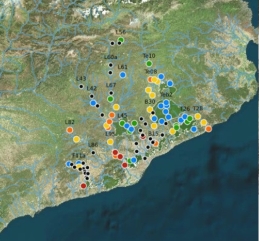15-04-2020
New report on river ecological quality in Barcelona area gets published
The quality of the water in rivers improved during the decade of 2000, but it got stuck after 2010 and it remains the same at the moment, according to the Report on ecological quality of rivers in the Barcelona area (2018-19). This study is carried out by the experts of the research group Freshwater Ecology, Hydrology and Management (FEHM) of the Faculty of Biology and the University of Barcelona, as part of the agreement with the Area of Infrastructure and Natural Areas of Diputació de Barcelona.
Rivers in the Barcelona provincial area: twenty-five years of scientific monitoring
The new report gathers the results of the analysis of a network of 111 study spots distributed around the five hydrographical basins -rivers Besòs, Foix, Llobregat, Ter and Tordera, and rivers in the coasts of Maresme- which drain in the area of Barcelona. This network, first studied in 1979 under the supervision of Professor Narcís Prat, has been the core of a scientific monitoring program since 1994. This program became one of the largest data series on hydrological studies worldwide.
Other participants in the study of the FEHM group, led by the lecturer Núria Bonada, from the Department of Evolutionary Biology, Ecology and Environmental Sciences, are the experts of the Biodiversity Research Institute (IRBio) and the Water Research Institute (IdRA) of the UB. This work results from a collaboration with Diputació de Barcelona, entity that supported the research teams over these years. Other collaborators in the monitoring are the Catalan Water Agency, the Center for the Study of Mediterranean Rivers and Tordera Observatory, among other institutions.
Temporary series to discover the evolution of the river ecological state
Apart from the annual information on the ecological state of rivers, this large-scale data series provides strategical information for researchers and managers to see the origins of changes that affect water ecosystems (anthropic impacts, global change, etc.). It is also a strategical tool to assess the improvements in water management and water ecosystems carried out by public administrations in accordance with the Water Framework Directive (WFD).
According to the report, the economic crisis in 2008 was an inflection point in the actions to improve the ecological state of water ecosystems. As a result, many projects on water restoration were paused due to its economic cost, like many interventions to prevent pollution and improve infrastructures related to hydrological management (removal of saline pollution in Llobregat River, adaptation of waste water treatment systems, recovery of gallery forest in urban or industrial basins, etc.).
Discovering and improving environmental protection for water ecosystems
Having a temporary series of data on the long term regarding Barcelona rivers enabled researchers to know about the evolution and improvement of water system protection when in episodes of environmental crisis. This would be the case of the rivers Mogent and Besòs, affected in December 2019 by a release of solvent in the industrial estate in Montornès del Vallès; the damaged areas by the forest fires in the Natural Park of Sant Llorenç del Munt i l’Obac (2003), or the altered basins due to droughts (2007-2008) and rainstorms.
In this context, data from the scientific monitoring points out a standstill in the quality and ecological state of rivers and streams, in areas that have good indicators and those that are not adapted to the WFD (in particular, mid and low parts of the five basins). The conclusions also note that there is a hypothetical disappearance of the insect Baetis alpinus -a species indicating environmental changes- in the mountain range Montseny if the environmental temperature continues to rise, as climate models foresee. According to the authors, it would be important to expand the studies on the streams in Montseny, which would have this species, now threatened by climate change.
The studies carried out by the FEHM research group have been determining to adopt and set the directions in the WFD to the Mediterranean rivers in Spain (for instance, Munné i Prat, 2009). In particular, the scientific contributions of the UB experts on temporary rivers -with intermittent water flows- enabled the launch of the European project LIFE TRivers and are an international model to universities, centers and managing entities in Europe regarding the adoption of new methods and study protocols to improve the management of water courses. This temporary series of data on Barcelona rivers has been used in many science articles in collaboration with international experts.
Source:PremsaUB
